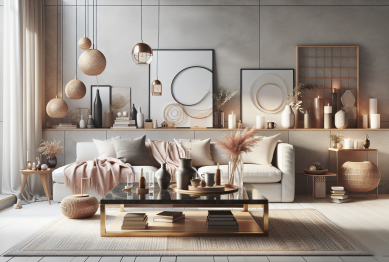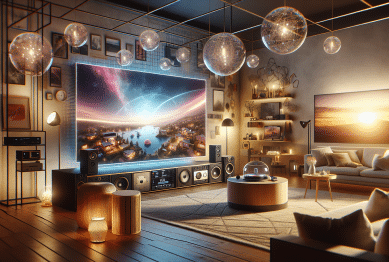In a world filled with constant distractions, overwhelming to-do lists, and an abundance of possessions, it’s easy to feel mentally cluttered and stressed. Many people strive for a sense of calm and clarity, yet find themselves bogged down by the chaos of modern life. The solution? Minimalist living: Minimalist Living Reduces Mental Clutter
Minimalism isn’t just about owning fewer things—it’s a mindset that promotes simplicity, intentionality, and focus. By embracing a minimalist lifestyle, you can reduce mental clutter, improve your focus, and create more mental space for what truly matters. In this article, we’ll explore how minimalist living can help you clear the mental clutter and lead a more intentional, stress-free life.

Why Minimalist Living is Key to Reducing Mental Clutter
1. Fewer Possessions Lead to Fewer Distractions: Minimalist Living Reduces Mental Clutter
The more possessions you have, the more you have to organize, clean, and maintain. These physical possessions can become constant reminders of things you need to do or take care of, creating mental distractions.
By simplifying your environment and reducing physical clutter, you eliminate these distractions and create a more peaceful, organized space. With fewer things to worry about, your mind is free to focus on the important aspects of life—such as your personal goals, relationships, and well-being.
-
Actionable Tip: Begin decluttering your home by removing items that don’t serve a functional or sentimental purpose. Start small with one area—such as your desk or closet—and work your way through the rest of your living space.
2. More Mental Space for What Matters
When your mind is cluttered with too many tasks, thoughts, and possessions, it becomes harder to focus on what really matters. Minimalist living encourages you to intentionally prioritize what brings value to your life, which creates more mental space for personal growth, creativity, and relaxation.
The more you simplify your daily life, the more you can focus on pursuing meaningful goals and cultivating positive habits, without being overwhelmed by unnecessary distractions.
-
Actionable Tip: Practice prioritization in your daily activities. Start by identifying your top three most important goals for the day or week, and eliminate or delegate anything that doesn’t directly contribute to these priorities.
3. Reduces Decision Fatigue
Every day, we’re faced with countless decisions, from what to eat, what to wear, and what activities to pursue. Each decision, no matter how small, takes up mental energy. Minimalist living helps reduce decision fatigue by simplifying your choices.
For example, owning fewer clothes means fewer decisions to make in the morning. Having a set routine or schedule allows you to make fewer decisions throughout the day, saving mental energy for more important tasks and decisions.
-
Actionable Tip: Implement routines and simplify your choices. Try creating a capsule wardrobe with a limited selection of versatile clothing items, and set up a consistent daily routine to minimize decision-making.
4. Promotes Mindfulness and Presence
Minimalist living encourages you to be more mindful and present in the moment. Without the constant distractions of physical clutter, unnecessary commitments, or mental overload, you can cultivate a greater sense of awareness and focus on the present. This mindfulness helps you reduce stress, improve well-being, and engage more fully with your surroundings.
By embracing minimalism, you can also create time for activities that promote mindfulness, such as meditation, yoga, or journaling.
-
Actionable Tip: Dedicate time each day to practice mindfulness, whether through meditation or a mindful walk. Focus on being present in whatever you’re doing, whether it’s enjoying a meal or simply relaxing at home.
How to Embrace Minimalist Living to Reduce Mental Clutter
1. Declutter Your Physical Space
The first step in embracing minimalist living is decluttering your physical environment. A cluttered space leads to a cluttered mind. By letting go of unnecessary possessions, you free up physical and mental space for things that truly add value to your life.
Focus on eliminating items that no longer serve a purpose or bring you joy. This can include old clothes, unused gadgets, or unnecessary paperwork. The goal is not to live with as few possessions as possible, but to only keep what truly adds value to your life.
-
Actionable Tip: Start by decluttering one area of your home, such as your living room or kitchen. Use the “one-in, one-out” rule: for every new item you bring into your home, let go of one item you no longer need.
2. Simplify Your Schedule
A busy schedule often contributes to mental clutter and stress. By simplifying your calendar and committing only to activities that align with your values, you can create more space for rest and reflection.
Minimalist living encourages saying “no” to unnecessary commitments and focusing on activities that bring joy, relaxation, or growth. This helps you stay energized, reduce overwhelm, and prioritize your time more effectively.
-
Actionable Tip: Review your schedule and identify commitments that drain your energy or don’t align with your goals. Consider eliminating or delegating these tasks to create space for more meaningful activities.
3. Create a Calm, Organized Home
Your home should be a sanctuary where you feel calm and relaxed. A minimalist living space fosters peace of mind by promoting cleanliness, simplicity, and functionality. To create a minimalist home, focus on removing excess furniture and decor, keeping only what serves a purpose or brings aesthetic pleasure.
-
Actionable Tip: Choose a neutral color palette for your home to create a calming atmosphere. Invest in multi-purpose furniture that helps maintain organization and minimizes visual clutter.
4. Streamline Your Digital Life
Digital clutter—such as overflowing inboxes, disorganized files, and constant notifications—can also contribute to mental clutter. Minimalism extends beyond the physical space and into the digital world. By simplifying your digital life, you can reduce distractions, improve productivity, and reclaim mental space.
-
Actionable Tip: Declutter your digital devices by organizing files, unsubscribing from unnecessary email lists, and turning off non-essential notifications. Schedule regular “digital detox” time to unplug from screens and focus on offline activities.
The Benefits of Minimalist Living for Mental Clarity
1. Improved Focus and Productivity
When you reduce distractions, whether physical or mental, you create an environment that supports focus and productivity. With fewer possessions to manage and a simplified schedule, you can dedicate your time and energy to what truly matters, leading to higher efficiency and better results.
2. Reduced Stress and Anxiety
Clutter and chaos contribute to feelings of stress and anxiety. Minimalism encourages a peaceful, organized environment that promotes relaxation and calm. By eliminating unnecessary distractions, you reduce the mental load and foster a sense of control over your life.
3. Increased Creativity
With fewer distractions and a more organized space, your brain has the freedom to think creatively. Minimalist living opens up mental space for new ideas, inspiration, and innovation, allowing you to tap into your creative potential.
Conclusion: Minimalist Living for a Clearer, Calmer Mind
Embracing minimalist living is more than just decluttering your home or cutting back on possessions—it’s about creating a lifestyle that reduces mental clutter and promotes clarity, focus, and peace of mind. By simplifying your environment, routines, and decisions, you can reduce distractions, lower stress, and open up mental space for what truly matters.
Start small by decluttering one area of your life, whether it’s your home, schedule, or digital space. As you adopt minimalist principles, you’ll notice a greater sense of calm, a clearer mind, and a more intentional approach to life.
References:
-
Kondo, M. (2014). The Life-Changing Magic of Tidying Up: The Japanese Art of Decluttering and Organizing. Ten Speed Press.
-
Becker, C. (2016). The More of Less: Finding the Life You Want Under Everything You Own. WaterBrook.
-
Harris, J. (2020). Digital Minimalism: Choosing a Focused Life in a Noisy World. Penguin Press.









